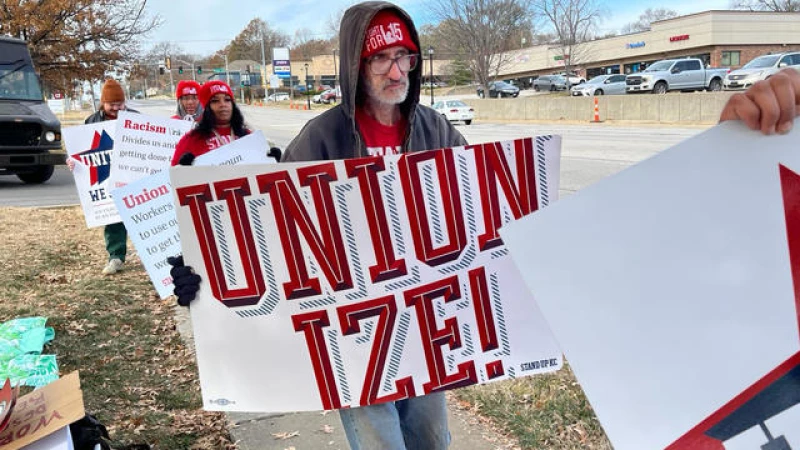Bill Thompson's wife had never seen him smile with confidence. For the first 20 years of their relationship, an infection in his mouth robbed him of teeth, one by one.
"I didn't have any teeth to smile with," the 53-year-old of Independence, Missouri, said.
Thompson said he dealt with throbbing toothaches and painful swelling in his face from abscesses for years working as a cook at Burger King. He desperately needed to see a dentist but said he couldn't afford to take time off without pay. Missouri is one of many states that do not require employers to provide paid sick leave.
So Thompson would swallow Tylenol and push through the pain as he worked over the hot grill.
"Either we go to work, have a paycheck," Thompson said. "Or we take care of ourselves. We can't take care of ourselves because, well, this vicious circle that we're stuck in."
In a nation that was sharply divided about government health mandates during the COVID-19 pandemic, the public has been warming to the idea of government rules providing for paid sick leave.
Before the pandemic, 10 states and the District of Columbia had laws requiring employers to provide paid sick leave. Since then, Colorado, New York, New Mexico, Illinois, and Minnesota have passed laws offering some kind of paid time off for illness. Oregon and California expanded previous paid leave laws. In Missouri, Alaska, and Nebraska, advocates are pushing to put the issue on the ballot this fall.
The U.S. is one of nine countries that do not guarantee paid sick leave, according to data compiled by the World Policy Analysis Center.
In response to the pandemic, Congress passed the Emergency Paid Sick Leave and Emergency Family and Medical Leave Expansion acts. These temporary measures allowed employees to take up to two weeks of paid sick leave for COVID-related illness and caregiving. But the provisions expired in 2021.
"When the pandemic hit, we finally saw some real political will to solve the problem of not having federal paid sick leave," said economist Hilary Wething.
Wething co-authored a recent Economic Policy Institute report on the state of sick leave in the United States. It found that more than half, 61%, of the lowest-paid workers can't get time off for an illness.
"I was really surprised by how quickly losing pay — because you're sick — can translate into immediate and devastating cuts to a family's household budget," she said.
Wething emphasized that missing even just a day or two of work can result in the equivalent of a month's worth of gasoline expenses for a worker or force them to choose between paying an electric bill or buying food. She highlighted the potential risks of showing up to work sick, not only for co-workers but also for customers. Occupations with low wages and no paid sick leave, such as cashiers, nail technicians, home health aides, and fast-food workers, involve a significant amount of face-to-face interactions.
"Paid sick leave is crucial for safeguarding the public health of a community and providing workers with the economic stability they urgently require when they need time off from work," she explained.
The National Federation of Independent Business has taken a stand against mandatory sick leave regulations at the state level, contending that workplaces should have the flexibility to negotiate arrangements with their employees when they fall ill. The organization raised concerns about the expenses associated with paying employees for time off, additional paperwork, and decreased productivity that can burden small businesses.
Research from the National Bureau of Economic Research indicates that following the implementation of such mandates, employees typically take an average of two more sick days per year compared to before the law was enacted.
Illinois recently implemented paid time off regulations. Lauren Pattan, co-owner of the Old Bakery Beer Co. in Illinois, shared that prior to this year, the craft brewery did not provide paid time off for its hourly workers. While Pattan expressed her support for the new law in Illinois, she also mentioned the challenges of determining how to cover the costs associated with it.
"Our priority is to create a positive work environment for our employees, but we also have concerns about our financial stability," she expressed.
This may result in the need for customers to pay higher prices to offset costs, according to Pattan.
In a heartfelt piece for the Kansas City Star newspaper, Bill Thompson shared his struggles with dental issues despite working full-time hours. "Many of my colleagues are without homes," he lamented. "Without access to healthcare, none of us can afford medical or dental care."
Thompson's story caught the attention of the community, leading to a local dentist offering pro bono services in 2018. This act of kindness allowed Thompson to have his remaining teeth extracted and replaced with dentures, putting an end to years of suffering from infections. Today, Thompson not only has a new smile but also a job in the food service industry at a hotel, complete with paid sick leave.
In his spare time, Thompson has been advocating for a ballot initiative that would secure a minimum of five days of paid sick leave annually for workers in Missouri. The organizers of the petition have confirmed that they have gathered sufficient signatures to present the initiative to voters.







